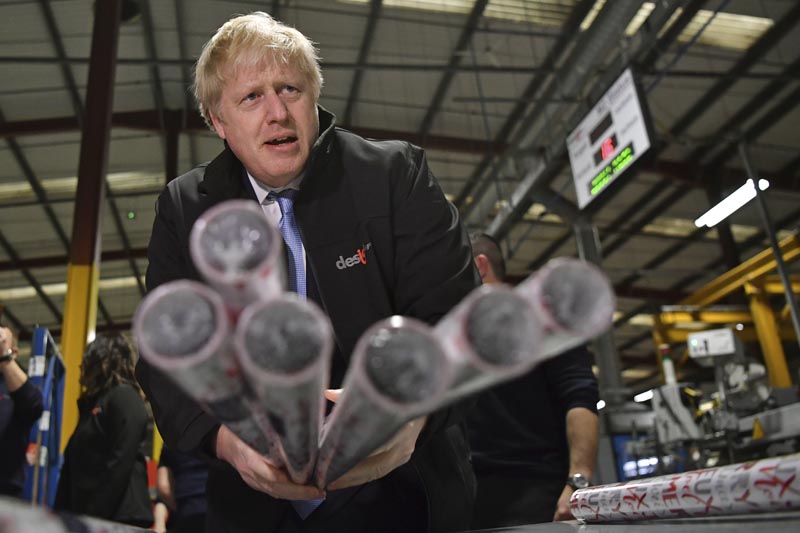The main parties and policies in the British election
LONDON: The United Kingdom's 46 million voters are choosing 650 new lawmakers in Thursday's elections for Parliament's lower House of Commons. Here is a look at the main parties and their policies:
The Conservative Party:
"Get Brexit Done" is the key message pushed – over and over -- throughout the campaign by flamboyant Prime Minister Boris Johnson and his Conservatives to an electorate weary of more than three years of political impasse over Britain's divorce from the European Union. Winning an outright majority in the House of Commons would clear the way for Johnson to win parliamentary approval for his EU divorce deal and see Britain leave the bloc by the current Jan. 31 deadline.
Johnson, 55, who became prime minister in July following an internal Conservative Party leadership contest rather than following national elections, also is pledging to invest in Britain's health service, recruit more police and introduce controls on an immigration system.
The Labour Party:
Left-wing Labour leader Jeremy Corbyn says his party will hammer out a new divorce deal with the EU within three months if it wins power and put the deal to a national referendum within six months, giving voters the option of backing the revised deal or choosing to remain in the EU.
The 70-year-old Corbyn, who has faced tough criticism during the campaign over his handling of allegations of anti-Semitism in his party, is promising policies including nationalizing Britain's railways, energy utilities and postal service, raising the minimum wage and providing free internet access for all homes.
Scottish National Party:
Party leader Nicola Sturgeon, who heads Scotland's legislature as first minister, is not standing for election in Thursday's vote. But she leads a party that hopes it will hold the balance of power in Britain if voters deliver a hung Parliament – with neither the Conservatives nor Labour holding an outright majority.
Sturgeon has made it clear that any party looking for her lawmakers' support will have to agree to another independence vote for Scotland, just five years after a referendum on the issue that was billed as a once-in-a-generation event. On Brexit, the SNP says it will support a second referendum on EU membership.
Liberal Democrats:
The centrist and unabashedly pro-European Liberal Democrats aim to halt Brexit altogether – a polarizing policy in this deeply divided country. But like the Scottish National Party, the Lib Dems will most likely be able to flex their political muscle only in the event of a hung parliament when they, too, could become kingmakers.
Jo Swinson's party also is committed to investing heavily in education, with free childcare for preschool age children of working parents, and to employ 20,000 new school teachers.
The Green Party:
Not surprisingly, the environmentalist party, which held just one seat in the last Parliament, has campaigned on a platform calling for a Green New Deal to transition to net zero carbon emissions by 2030. On Brexit, the Greens are pro-EU and want a second referendum.
The party is led by Jonathan Bartley and Sian Berry, while its lone lawmaker was Caroline Lucas.
The Brexit Party:
The deeply euroskeptic Brexit Party led by Nigel Farage is fielding candidates in a national election for the first time. Farage wants a sharp break with the EU so Britain will no longer be aligned to the bloc's rules and standards. But, seeking to broaden his party's appeal, Farage also is trumpeting policies including the abolition of Parliament's unelected upper chamber, the House of Lords, and wants to slash immigration to under 50,000 people a year, less than a quarter of current levels.






